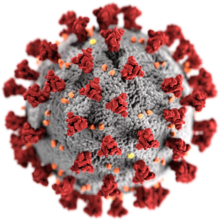Shortages related to the COVID-19 pandemic
medical material and other goods shortages occurring as a result of the COVID-19 pandemic
Medical materials and other goods shortages caused by the COVID-19 pandemic quickly became a major issue of the pandemic.

Quotes
edit- The scale of the plague is surprising, indeed shocking, but not its appearance. Nor the fact that the U.S. has the worst record in responding to the crisis. [...] Market signals were clear: There’s no profit in preventing a future catastrophe. [...] The government could have stepped in, but that’s barred by reigning doctrine: "Government is the problem," Reagan told us with his sunny smile, meaning that decision-making has to be handed over even more fully to the business world, which is devoted to private profit and is free from influence by those who might be concerned with the common good. The years that followed injected a dose of neoliberal brutality to the unconstrained capitalist order and the twisted form of markets it constructs. The depth of the pathology is revealed clearly by one of the most dramatic — and murderous — failures: the lack of ventilators that is one the major bottlenecks in confronting the pandemic.
- Noam Chomsky in an interview with C.J. Polychroniou, "Chomsky: Ventilator Shortage Exposes the Cruelty of Neoliberal Capitalism", Truthout (April 1, 2020)